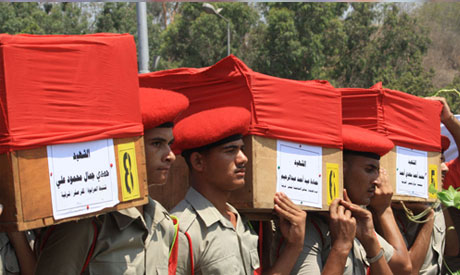
A military funeral open to the public in the absence of the president surprised many Egyptians mourning the deaths of 16 border guards killed on Sunday near Egypt's border with the besieged Gaza Strip.
President Mohamed Morsi, who had been expected to attend the funeral, did not show up for "security reasons," while his newly-appointed prime minister, Hisham Qandil, was attacked by angry protesters after attending funeral prayers. Protesters shouted chants against the Muslim Brotherhood, the president and the new government, accusing Qandil and "his people" of killing the slain soldiers.
Qandil was not the only one attacked before the funeral. Nader Bakkar, spokesman for the Salafist Nour Party, was also assaulted, as were some other activists known for their pro-Brotherhood sympathies. Among the latter were Asmaa Mahfouz and Ahmed Doma of the 6 April Youth Movement. Abdel-Moneim Abul-Fotouh, former presidential candidate and former leading Brotherhood member, was also attacked.
The same protesters hailed former MP and writer Mustafa Bakry, known for his critical stance regarding the Brotherhood and the president and his support for Egypt's military council. Bakry was seen chanting against the president and the Brotherhood only minutes before Field Marshal Hussein Tantawi, head of the military council, former prime minister Kamal El-Ganzouri and other political figures began leading the funeral.
Although Bakry has led a campaign against Morsi, he did not go so far as to claim that Morsi’s sympathy with Gaza-based resistance group Hamas had been the reason for the death of the Egyptian soldiers. Others in his camp, however, did.
Former liberal MP Mohamed Abu-Hamed and media figure Tawfiq Okasha were considerably more vocal. On Monday night, Okasha, owner of the Fareen satellite television channel, went so far as to threaten Morsi if he dared show up at the soldiers' funeral. Okasha, Abu-Hamed and others are calling for a million-man march against Morsi and the Brotherhood on 24 August.
Many critics of the Muslim Brotherhood point their fingers at Morsi, accusing him of serving the interests of Gaza at the expense of the safety and welfare of the Egyptian people. In July, a rumour that Palestinians would be granted entry into Egypt without visas raised an uproar, as did Morsi’s pardon of a group of Islamists jailed for militancy during the Mubarak era. The pardon granted to 26 Islamists, many of them held since the 1990s, was seen as a gesture to hardliners who supported Morsi's presidential bid.
Those who criticised Morsi's attempt to release members of Al-Gamaa Al-Islamiya, jailed during the group's armed insurrection against the Mubarak regime in the 1990s, along with members of the Islamic Jihad, the movement allegedly behind the 1981 assassination of president Anwar Sadat, seemed to have forgotten that hundreds of members of the same groups had been released by the military council in the weeks following Mubarak's ouster last year.
Those released by the military council included Aboud and Tarek El-Zomor, who had been directly involved in killing Sadat. The El-Zomor cousins subsequently formed a political party that managed to win seats in Egypt's first post-Mubarak parliamentary polls.
"Trying to blame Islamists for the Sinai border attack is unacceptable," Tarek El-Zomor told Ahram Online. "Those who do so want to divert attention from the real killer, Israel. They want to blame Morsi for what happened, and we all know this isn't true."
But whether the president is to be held accountable for Sunday's border attack is not the only question now. Morsi's supporters from outside the Islamist political current are now questioning his ability to exert his presidential authorities.
"There is more to what happened than just the president's promises that those involved in the border attack will be severely punished or that security will be restored to the Sinai Peninsula," said Mohamed Abdel-Aziz of Egypt's Kefaya protest movement. "No matter who perpetrated the attack, it is clear that Egyptian intelligence, army and police lack the capability to deal with such incidents."
Abdel-Aziz went on to point to the fact that Israel's Counter-Terrorism Bureau had issued a statement only days before the border incident warning its citizens of an imminent attack in Sinai. "It is the role of the president to punish those responsible for ignoring such warnings, or who were not able to deal with it," he said.
On Tuesday, when the president failed to show up for the funeral for "security reasons," prominent columnist Belal Fadl declared on Twitter: "If Morsi did not attend the funeral for security reasons, he has to punish all the [security] leaders who fail to secure their president or else he has to resign as this would be more dignified than this fiasco."
Fadl reminded his followers that the same president who failed to attend the funeral swore his presidential oath in Tahrir Square weeks earlier telling tens of thousands of supporters that he was not afraid of the counter-revolution.



